Ever wondered why people say humor is the hardest thing to learn in another language? That’s where jokes in Korean—especially 아재개그 (dad jokes)—come in. These puns are groan-worthy, clever in their own way, and give you a peek into everyday Korean culture.
In fact, jokes are one of the best ways to remember new words. Studies on language learning show that humor boosts memory and retention compared to rote memorization. So by diving into these funny Korean jokes, you’re not just laughing—you’re learning.
In this article, we’ll explore over 50 Korea jokes, complete with English translations and explanations. Whether you’re curious about Korean jokes in English, want to laugh at some lighthearted jokes about Korea, or just need a list of silly puns to share with friends, you’ll find them all here. .
Konglish: 30+ Korean Loanwords You Never Knew Existed
15+ Korean Insults That Won’t Get You Slapped (Probably)
K-pop Demon Hunters: Traditional Korean Easter Eggs You Probably Missed

What Are 아재개그?
In Korea, 아재개그 are the local version of dad jokes. The word 아재 is a cheeky way to say “middle-aged man,” and 개그 means “joke.” Put them together, and you get the kind of corny puns and wordplay that uncles and dads love to tell at the dinner table or in the office.
These jokes usually rely on how Korean words sound alike. For example: “햄버거가 웃으면? → 빵터짐”—literally “the bread bursts,” but also slang for “bursting into laughter.” They’re not witty so much as groan-worthy, but that’s the charm.
Once seen as old-fashioned, 아재개그 have made a comeback online as “legendary dad jokes.” They’re so bad they’re good, and they show how humor in Korea often comes from playful twists in language. They can also be known as nonesense quiz.
Let's test your korean jokes knowledge with a quiz?
Korean Jokes Quiz!
1.If you saw a tree?
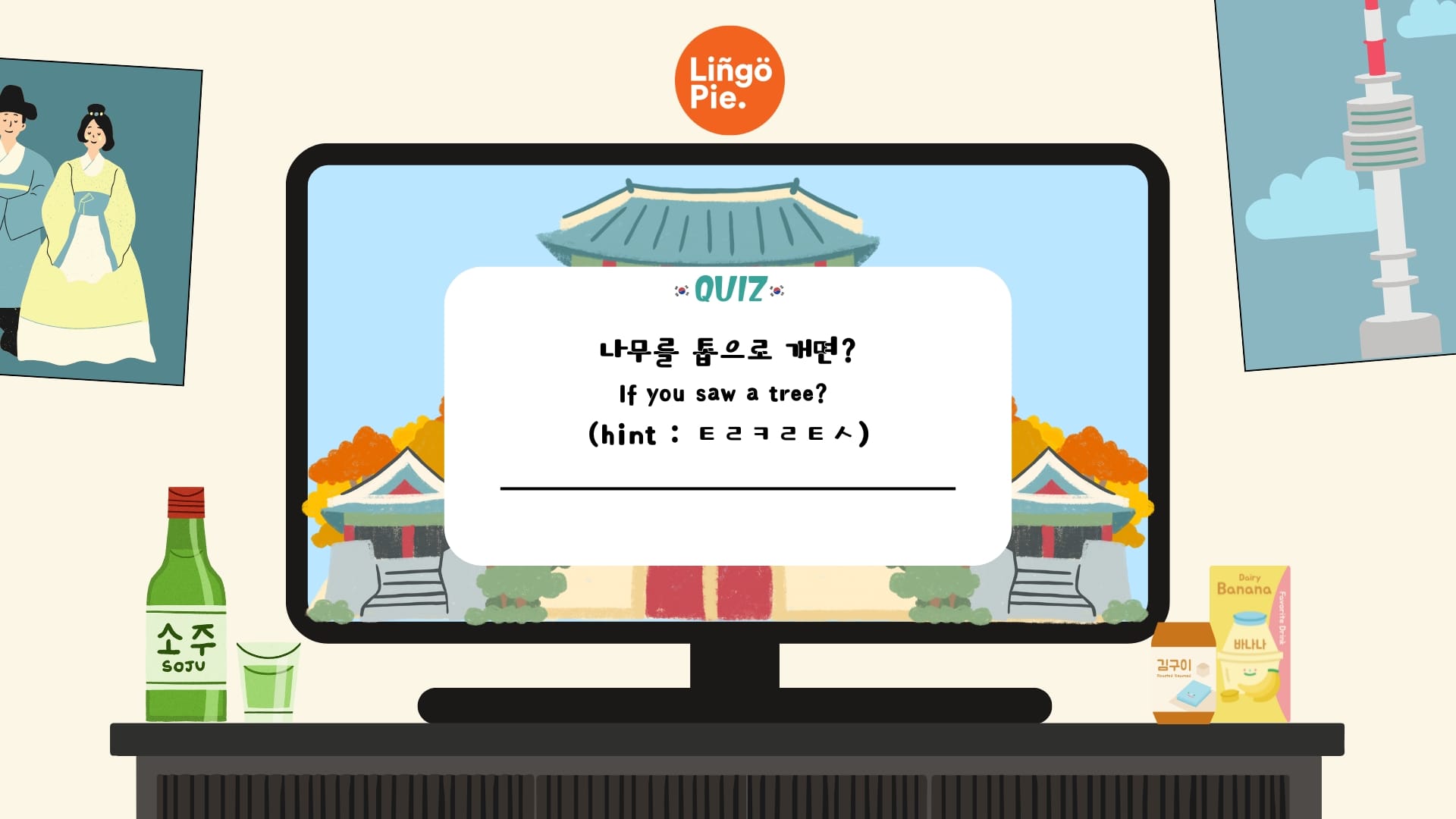
- Riddle: 나무를 톱으로 자르면? (If you saw a tree?)
- Answer: 트리케라톱스.
- Explanation: “Tree” plus “톱 (top/saw)” combine to sound like Triceratops. It’s just mashing English and Korean into a dinosaur pun.
2.What gets dirtier the more you clean?
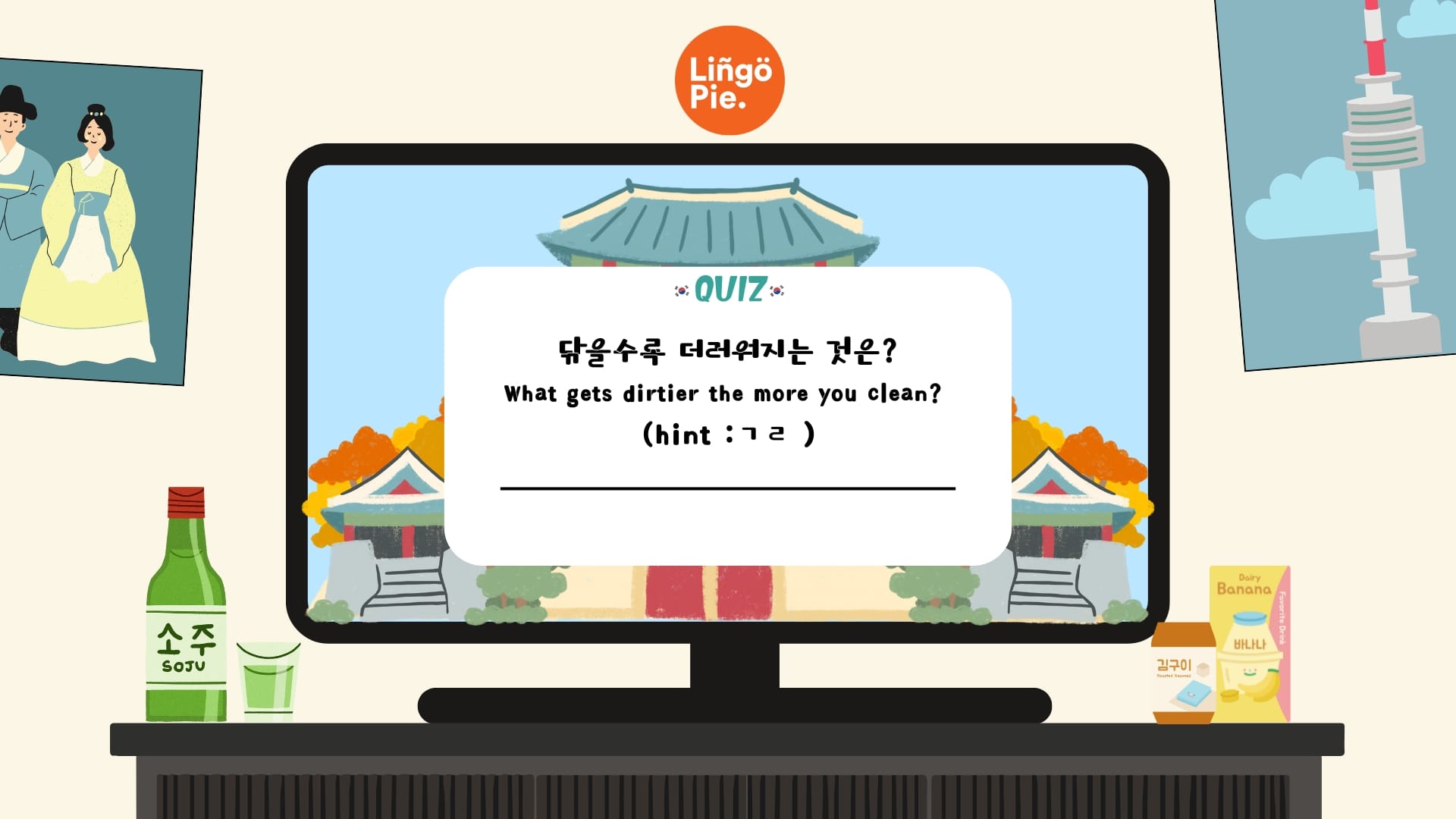
➡️ Answer: 걸레 (Rag)
💡 Explanation: The rag itself gets dirtier as you wipe.
3.What is a poison that removes poison?
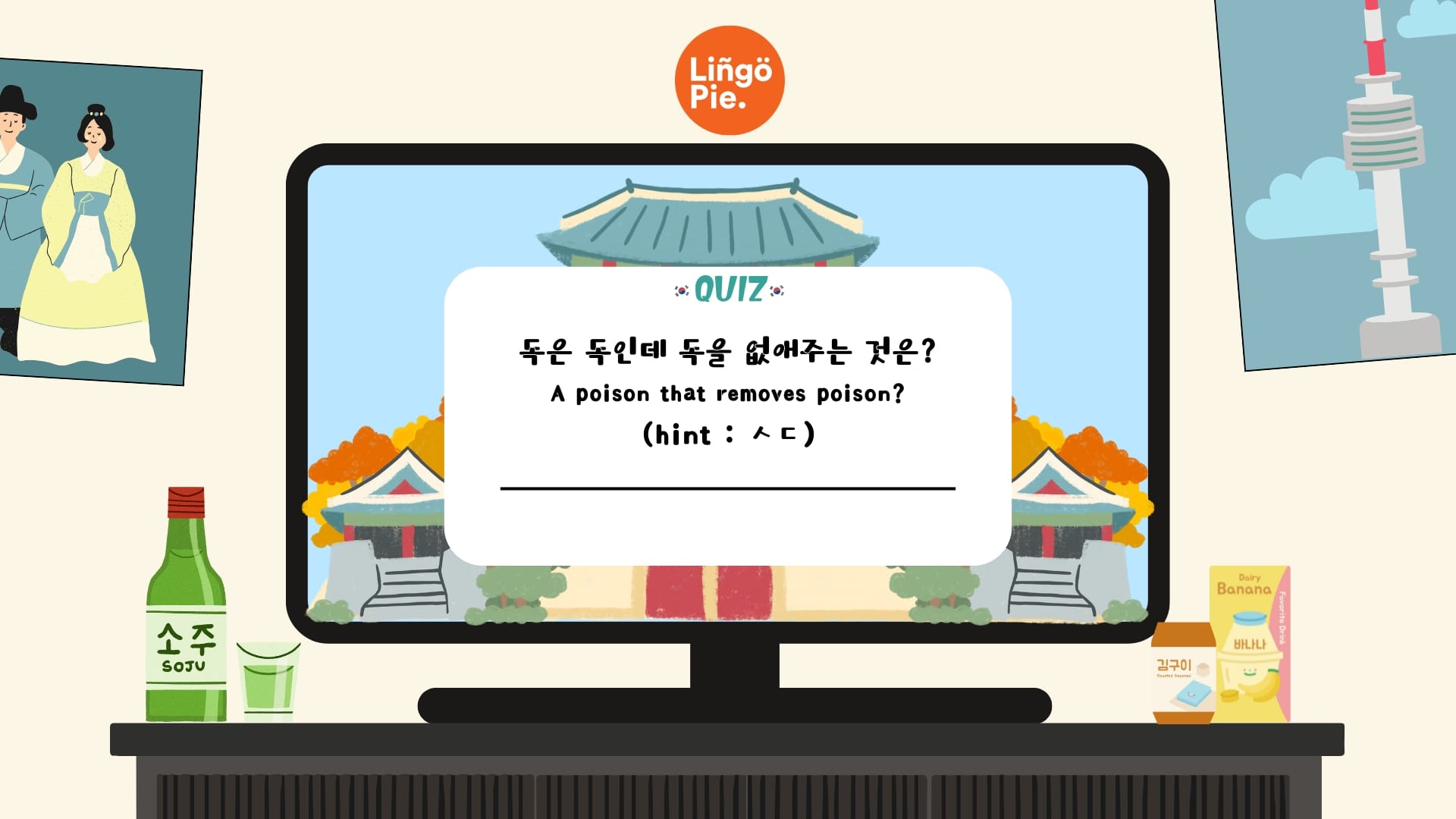
Riddle (Korean): 독은 독인데 독을 없애주는 것은?
English: A poison that actually removes poison?
Hint: ㅅㄷ
Answer: 소독 (disinfection)
Explanation: “독” = poison. “소독” means to disinfect. Same syllable, different meaning.
4.How can two beat five?
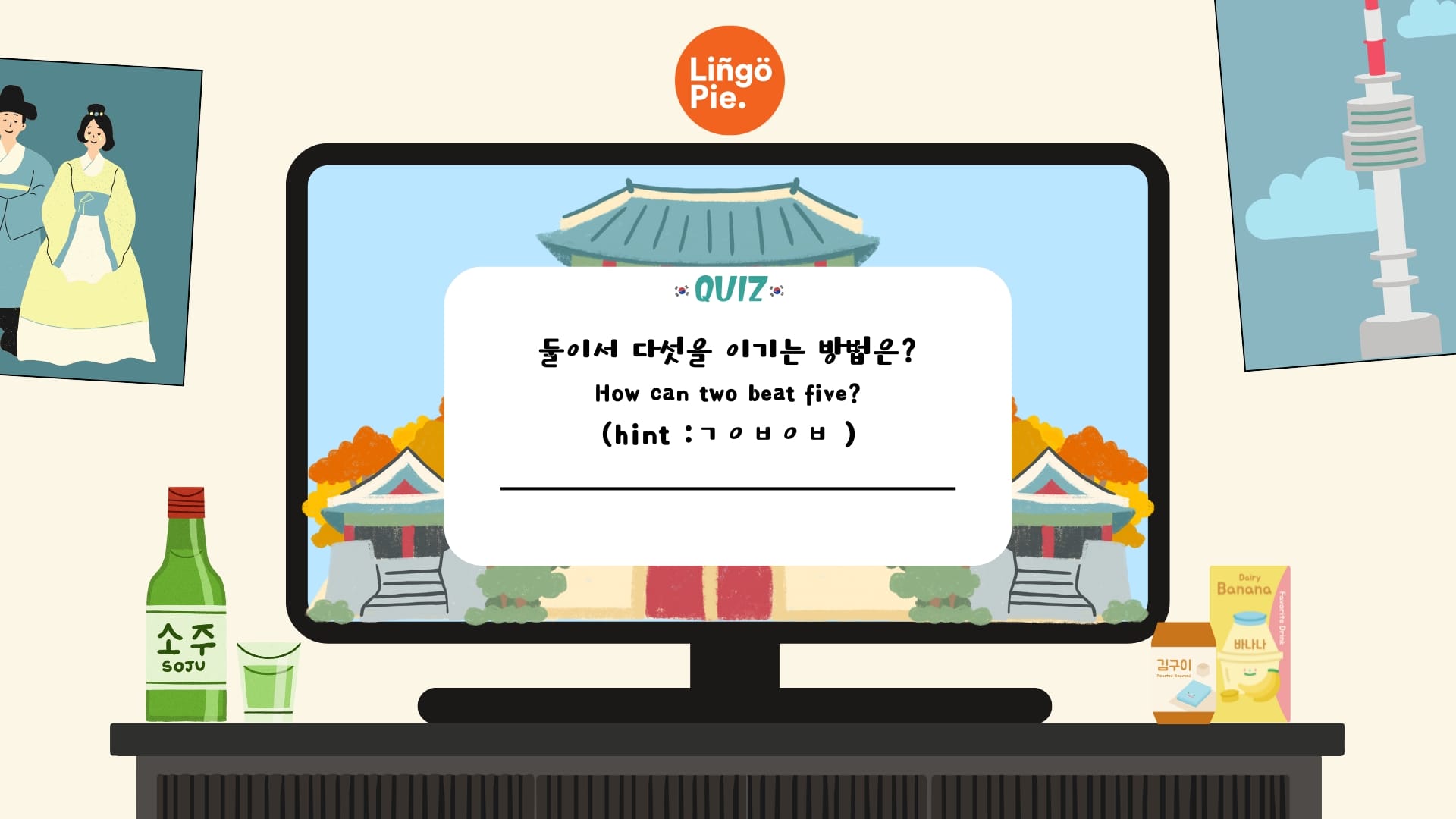
Riddle (Korean): 둘이서 다섯을 이기는 방법은?
English: How can two beat five?
Hint: ㄱㅇㅂㅇㅂ
➡️ Answer: 가위바위보 (rock-paper-scissors)
💡 Explanation: Two people playing can “beat five” (the number shown with hands). A numbers-and-game pun.
5.Which neighborhood in Seoul has the most movies?
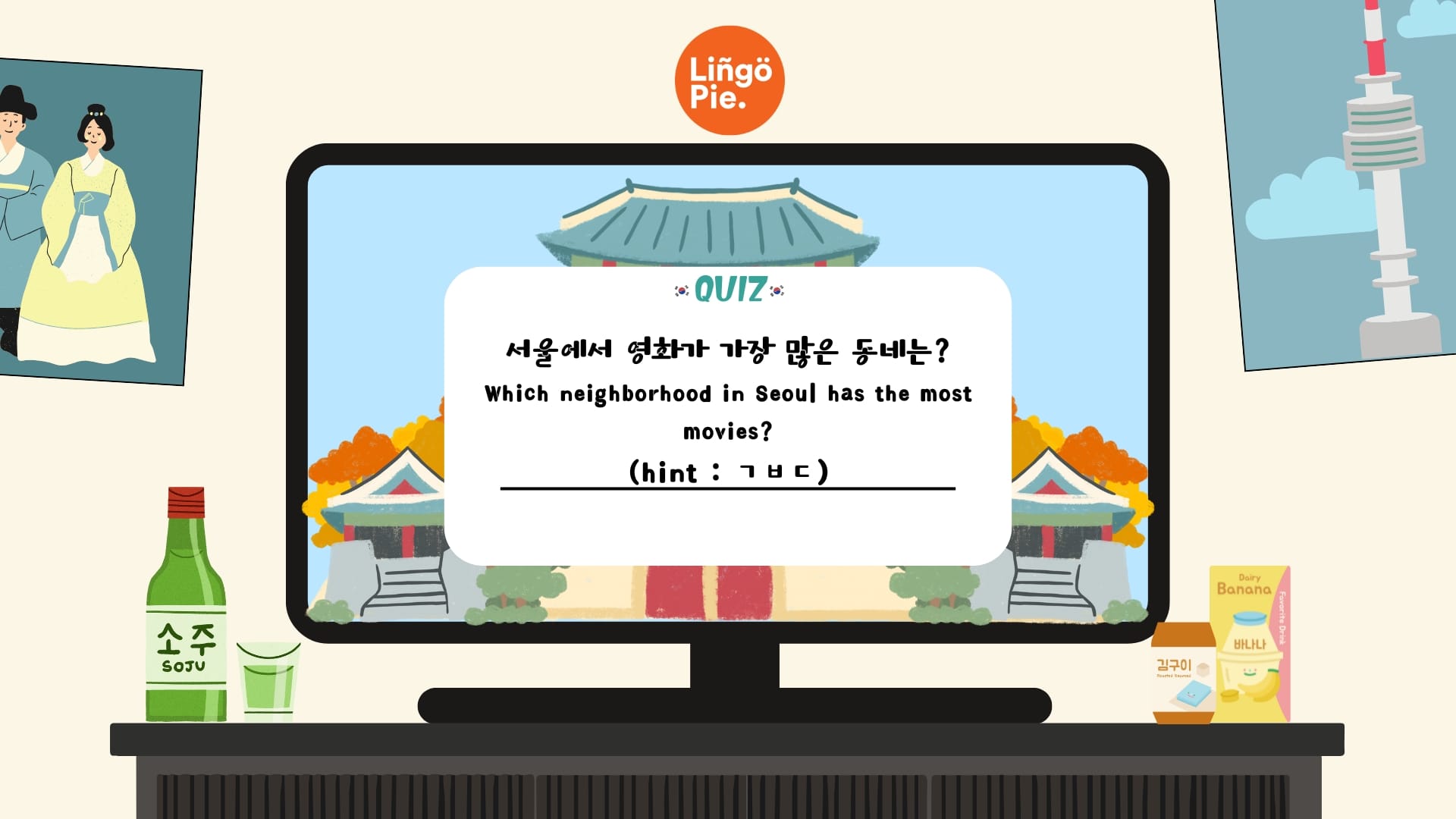
Riddle (Korean): 서울에서 영화가 가장 많은 동네는?
English: Which neighborhood in Seoul has the most movies?
Hint: ㄱㅂㄷ
➡️ Answer: 개봉동 (Gaebong-dong)
💡 Explanation: “개봉” means release (like a movie release). It’s also the name of a real neighborhood.
6.What’s the most expensive bird in the world?
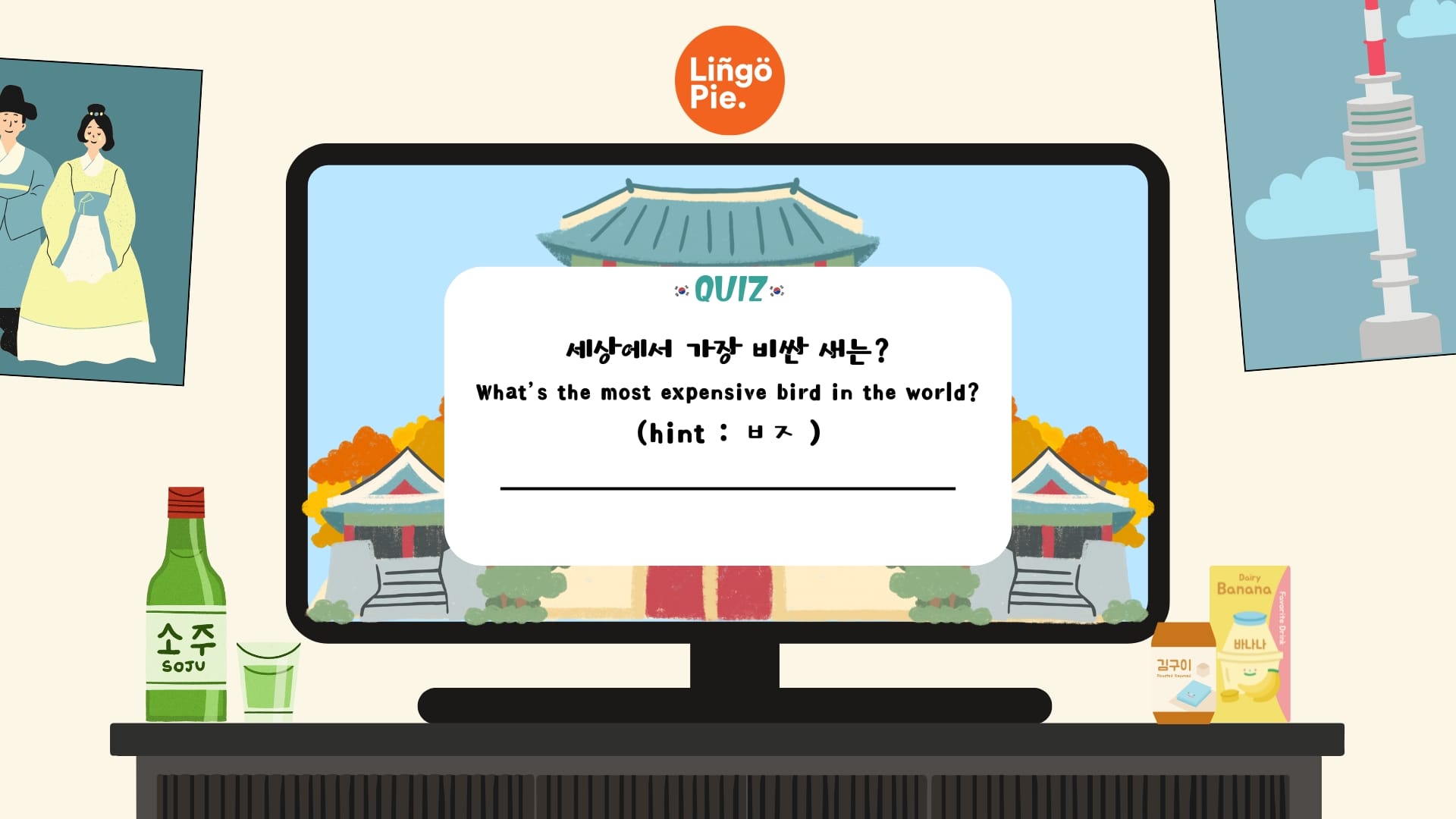
Riddle (Korean): 세상에서 가장 비싼 새는?
English: What’s the most expensive bird in the world?
Answer: 백조 (baekjo, swan)
Explanation:
This is a homophone pun. In Korean, 백조 has two meanings depending on the Chinese characters (hanja):
- 白鳥 = swan (literally “white bird”)
- 百兆 = one hundred trillion
So 백조 can be heard as either “swan” or “100 trillion,” making it the “most expensive bird.” The joke hinges on identical pronunciation with wildly different meanings.
7.How do you write 12356789 in four syllables?
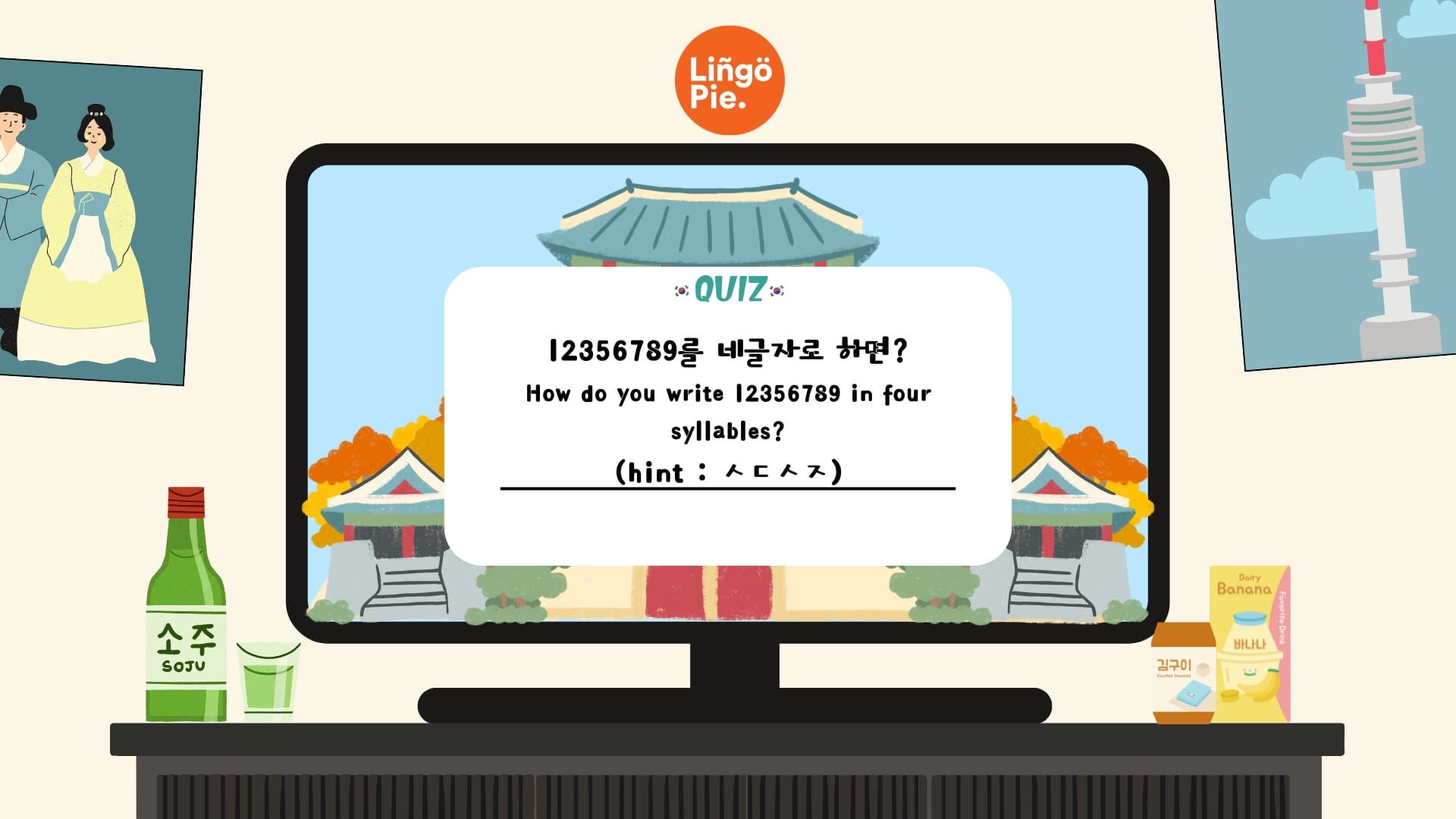
Riddle (Korean): 12356789를 네 글자로 하면?
English: How can you write 12356789 in four syllables?
Answer: 사도세자 (Sado Seja)
Explanation:
The number sequence 12356789 skips the number 4 (사, sa). The answer, 사도세자, is a pun:
- In one sense, it’s the name of a real Korean crown prince, Prince Sado.

- But broken down another way:
- 사도 (sado) can be read as “omit 4” (사 = 4, 도 = interpreted here as “leave out / exclude”).
- 세자 (seja) comes from 세다 (“to count”) + -자 (“let’s”), meaning “let’s count.”
So together, 사도세자 literally means “Let’s count, except for 4.” That perfectly describes the missing number in 12356789, while also matching the historical prince’s name.
Food Jokes – 밥상 위의 웃음
1.세상에서 제일 뜨거운 과일은? → 천도복숭아
Literal: What’s the hottest fruit? → “Cheondo peach.”
Explanation: “천도” sounds like “천도(1000 degrees)” = extremely hot.
2.간장, 된장, 고추장을 섞어서 먹으면? → 젠장
Literal: Mix soy sauce, bean paste, chili paste → “Jenjjang.”
Explanation: 젠장 is a mild curse word (“darn it!”). It’s made by mashing the names of sauces (장 = paste).

3.김을 불에 구우면 안 되는 이유는? → 기미 주근깨
- Literal: Why shouldn’t you roast seaweed? → Freckles.
- Explanation: “김” (seaweed) and “기미” (freckles) sound similar. Burning “김” makes “기미.”
4.햄버거가 웃으면? → 빵터짐

Literal: When a burger laughs? → Bread explosion.
Explanation: 빵 = bread, but 빵터지다 means to “burst out laughing.”
5.한입 배어 먹은 사과는? → 파인애플
Riddle (Korean): 한입 배어 먹은 사과는?
English: What do you call an apple with one bite taken out of it?
Answer: 파인애플 (pineapple)
Explanation:
This riddle relies on a Korean–English sound pun.
- In Korean, 파이다 can mean “to be dug into / to be bitten into.” So 파인 사과 = “a bitten apple.”
- In English, 파인 (pain / pine) is how pine is pronounced in Korean loanwords.
- Combine that with 애플 (apple) and you get 파인애플, the fruit pineapple.
So a “bitten apple” in Korean wordplay becomes a pineapple.
6.도둑이 가장 싫어하는 아이스크림은? → 누가바

Literal: What ice cream do thieves hate? → Nougat bar.
Explanation: “누가” = “who?” (like when police ask “who did it?”).
6.다리미가 좋아하는 음식은? → 피자
Literal: Iron’s favorite food? → Pizza.
Explanation: “피자” sounds like “press it” (피다).
7.뽑으면 우는 식물은? → 우엉
Literal: What plant cries when pulled out? → Burdock.
Explanation: 우엉 sounds like “우엉~” (crying sound).
8.세상에서 가장 긴 음식은? → 참~~기름

Literal: The longest food? → Sesame oil.
Explanation: The joke is a play on sounds. 참기름 (sesame oil) is pronounced cham-gi-reum, which sounds almost the same as 참 길음 (cham gil-eum), meaning “really long.” So the “longest food” isn’t about the shape—it’s just a pun where the food’s name sounds like the phrase “very long.”
9.김밥이 죽으면 가는 곳은? → 김밥천국
Riddle (Korean): 김밥이 죽으면 가는 곳은?
English: Where does kimbap go when it dies?
Answer: 김밥천국 (Kimbap Cheonguk, “Kimbap Heaven”)
Explanation:
김밥천국 is the name of a famous budget restaurant chain in Korea, known for serving kimbap and other quick meals. Literally, the name means “Kimbap Heaven.” The joke is that when kimbap “dies,” it naturally goes to Kimbap Heaven—a playful twist that uses the real restaurant name as the punchline.

Animal Jokes – 자연 속 유머
10.소가 계단을 오르면? → 소오름
Riddle (Korean): 소가 계단을 오르면?
English: What happens when a cow climbs the stairs?
Answer: 소오름 (so-oreum)
Explanation: 소 = cow. 소름 = goosebumps. By inserting “소” again, you get 소오름, which sounds like “so-oreum,” a playful stretch of goosebumps.
11.소가 타 죽으면? → 탄소
Riddle (Korean): 소가 타 죽으면?
English: What do you call it when a cow burns to death?
Answer: 탄소 (tanso, carbon)
Explanation: 탄 = burnt, 소 = cow. Put together, 탄소 is the real word for “carbon.”
12.닭이 자부심을 느끼면? → 프라이드 치킨
Riddle (Korean): 닭이 자부심을 느끼면?
English: What do you call a proud chicken?
Answer: 프라이드 치킨 (fried chicken)
Explanation: In Korean, 프라이드 can sound like both pride and fried. So a chicken with pride becomes fried chicken.
13. 용이 놀라면? → 띠용!!
Riddle (Korean): 용이 놀라면?
English: What happens if a dragon is startled?
Answer: 띠용!! (tti-yong!!)
Explanation: 용 = dragon. 띠용 is a Korean cartoon sound effect showing surprise. Put them together and you get a dragon going “띠용!!”
14.사슴이 눈이 좋으면? → 굿아이디어
Riddle (Korean): 사슴이 눈이 좋으면?
English: If a deer has good eyesight, what do you call it?
Answer: 굿아이디어 (good idea)

Explanation: 아이디어 = idea. It also contains 아이 (eye). A deer (사슴) with good eyes becomes a pun: “good idea.”
15.세상에서 제일 멋진 새는? → 내 생김새
Riddle (Korean): 세상에서 제일 멋진 새는?
English: What’s the coolest bird in the world?
Answer: 내 생김새 (nae saeng-gim-sae, my appearance)
Explanation: 새 = bird. But 생김새 = appearance, looks. So the “best bird” is actually “my looks.”
16.신혼부부가 좋아하는 곤충은? → 잠자리

Riddle (Korean): 신혼부부가 좋아하는 곤충은?
English: What insect do newlyweds love most?
Answer: 잠자리 (dragonfly)
Explanation: 잠자리 means dragonfly, but literally also means “a place to sleep” → “bed.” Newlyweds like both meanings.
17.용이 승천하다를 4글자로 줄이면? → 올라가용
Riddle (Korean): 용이 승천하다를 네 글자로 줄이면?
English: How do you shorten “the dragon ascends” into four syllables?
Answer: 올라가용 (ollaga-yong)
Explanation: 올라가요 = “go up.” Attach 용 = dragon, and it becomes a cute pun phrase: “I’m going up, dragon.”
18.소가 감전사로 죽으면? → 우사인볼트

Riddle (Korean): 소가 감전사로 죽으면?
English: What do you call it when a cow dies from electrocution?
Answer: 우사인볼트 (Usain Bolt)
Explanation:
This is a sound-based pun:
- 우 (u) is the onomatopoeic sound of a cow (“moo”) in Korean.
- 볼트 (bolteu) means “bolt,” as in an electric bolt.
Put them together and you get 우-볼트, which sounds like Usain Bolt, the world-famous sprinter.
The humor is in combining a tragic situation (a cow electrocuted) with the name of a celebrity, purely through wordplay
Workplace Jokes – 직장 아재개그
19.대리가 출근을 안하면? → 대리결근
Literal: If assistant manager doesn’t come? → Proxy absence.
Explanation: 대리 = assistant manager, 결근 = absence.
20.슈퍼맨이 팔짱을 자주 하는 이유는? → 주머니가 없어서
Literal: Why does Superman cross his arms? → No pockets.
Explanation: In Korea, it’s common for people to put their hands in their pockets when standing around. But Superman’s tight spandex suit doesn’t have any! So instead, the joke says he frequently folds his arms (팔짱을 끼다) because he has no pockets to put his hands in.
21.높은 곳에서 출산하면? → 하이에나
Riddle (Korean): 높은 곳에서 출산하면?
English: What do you call giving birth in a high place?
➡Answer: 하이에나 (hyena)
Explanation: This is pure wordplay. The Korean phrase 하이에나 (ha-i-e-na), the animal hyena, can be broken down into:
- 하이 (high) → from English high (a tall place),
- 애 나 → in Korean, “애 나” means “a child is born.”
So, “high + child born” = hyena.
22.신사가 소개할 때? → 신사임당
Riddle (Korean): 신사가 소개할 때?
English: When a gentleman introduces himself?
Answer: 신사임당 (Shin Saimdang)

Explanation: 신사임당 is the name of a famous Korean historical figure, who also appears on the 50,000-won bill. But when the syllables are broken apart, the name also sounds like a phrase:
- 신사 = gentleman
- 임당 can be heard as “I am introducing.”
So the joke is that “신사임당” refers both to the historical figure and to the idea of “a gentleman introducing himself.”
23.새우 드라마는? → 대하드라마
Riddle (Korean): 새우 드라마는?
English: What do you call a shrimp drama?
Answer: 대하드라마 (daeha deurama)
Explanation: In Korean, 대하 has two meanings:
- literally, “big shrimp,”
- and figuratively, “epic” (as in “grand in scale”).
So 대하드라마 can mean either “a shrimp drama” or “an epic drama,” making it a simple but clever pun.
24.남을 등쳐먹는 사람은? → 안마사
- Riddle (Korean): 남을 등쳐먹는 사람은?
English: Who is someone that “makes a living by rubbing others’ backs”?
Answer: 안마사 (anmasa, massage therapist / masseur)
Explanation: In Korean, the phrase 등쳐먹다 literally means “to exploit someone” (take advantage of them), but word-for-word it can also be read as “live off someone’s back.” A massage therapist, or 안마사, literally earns a living by pressing and rubbing people’s backs. The riddle turns the negative idiom into a funny, literal answer.
25.장사꾼이 싫어하는 경기? → 불경기
Riddle (Korean): 장사꾼이 제일 싫어하는 경기는?
English: What kind of “game” do merchants hate the most?
Answer: 불경기 (bul-gyeong-gi, recession)
Explanation: The pun works because the Korean word 경기 (gyeonggi) has two meanings:
- Game or match (like a sports game).
- Economic conditions (the state of the economy).
So when you ask, “What game (경기) do merchants hate most?”, the trick answer is 불경기. Literally it means “bad economy” (recession), but it also plays on the double meaning of “경기.”
The humor comes from the wordplay: instead of thinking of a sports match, the answer is the “economic game” that merchants dread—a recession.
26.밥 먹고 살기 위한 내기? → 모내기
Riddle (Korean): 밥 먹고 살기 위한 내기?
English: What kind of “bet” do you make in order to eat and live?
Answer: 모내기 (monaegi, rice planting)
Explanation: The joke comes from how the words 내기 (naegi, a bet) and 모내기 (monaegi, rice planting) sound. By adding 모 (“seedling”) in front of 내기 (bet), you get 모내기, which literally means rice planting. Rice planting is, of course, essential for eating and living in a traditional Korean context.
So the riddle plays on:
- 내기 = bet
- 모내기 = rice planting
The pronunciation link creates the punchline: the “bet for survival” is really rice planting.
27.맥주가 죽기 전 남긴 말은? → 유언비어

Riddle (Korean): 맥주가 죽기 전 남긴 말은?
English: What does beer say before it dies?
Answer: 유언비어 (yu-eon bi-eo)
Explanation: This is a pronunciation pun.
- 유언비어 normally means “groundless rumor” or “false report.”
- But if you break it down:
- 유언 = last words, a will or testament,
- 비어 sounds exactly like the English word beer in Korean.
So together, 유언비어 can mean both “beer’s last words” and “a baseless rumor.”
Numbers & Language Puns
Here the jokes rely on English-Korean mixing and word sounds.
28.If RAIN goes to LA, what do you get?
Riddle (Korean): 비가 LA로 가면?
English: If Bi goes to LA, what do you get?
Answer: LA갈비 (LA galbi, Korean-style short ribs)
Explanation: This is a celebrity + wordplay pun.
- 비 (Bi) is the stage name of a famous Korean singer/actor (his name literally means “rain”).

- If “Bi goes to LA,” you combine LA + 갈비 (galbi, ribs) to get LA갈비, the popular Korean BBQ dish.
- Phonetically, “LA + 갈비” sounds like “LA galbi,” but in the riddle it’s reinterpreted as “LA + (singer) Bi.”
So the punchline is that when Bi goes to LA, you don’t just get a singer abroad—you get a plate of LA galbi.
29.한국 원, 일본 엔, 호주는? → 호주머니.
Riddle (Korean): 한국 원, 일본 엔, 호주는?
English: Korea has the won, Japan has the yen—what about Australia?
Answer: 호주머니 (hojumoni, “pocket”)
Explanation:
This sets up a pattern of “country → currency.” In Korean:
- 한국(대한민국) → 원 (won)
- 일본 → 엔 (yen)
So you expect “Australia → Australian dollar.”
The punchline breaks the pattern with a sound-alike: 호주 means Australia, and 호주머니 is the everyday word for pocket. Heard another way, 호주머니 can be cheekily parsed as “호주 + 머니 (Australia + money),” which fits the currency pattern—but it’s actually just the word pocket.
That mismatch between the expected currency and the real meaning (pocket) is the joke.
Everyday Life Jokes
Example:
30.화장실에서 방금 나온 사람은? → 일본 사람.
Riddle (Korean): 화장실에서 방금 나온 사람은?
English: Who just came out of the bathroom?
Answer: 일본 사람 (ilbon saram, sounds like “Japanese person”)
Explanation:
This is a sound-alike pun. In Korean, 일본 사람 normally means “Japanese person.” But if you split the syllables differently, it becomes 일 본 사람—literally “a person who did number one.” In Korean restroom slang, “number one” (일) means urinating and “number two” (이) means defecating. So 일 본 사람 = “someone who just peed,” which fits the bathroom setup, and it’s a homophone of 일본 사람 (“Japanese person”).
31.남자끼리 낚시 가면 위험한 이유는? → 보이스피싱.
Riddle (Korean): 남자끼리 낚시 가면 위험한 이유는?
English: Why is it dangerous if only men go fishing together?
Answer: 보이스피싱 (voice phishing)
Explanation:
This one is a pun based on Korean pronunciation.
- 낚시 (nakshi) means fishing.
- If only men (남자) go, then it’s a “boys-only fishing.”
- Spoken quickly, “boys fishing” sounds like 보이스 피싱 (voice phishing), which is the term for telephone scams in Korea.
So the joke is that “boys fishing” turns into “voice phishing,” which is of course dangerous.
32.거울에서 내가 나오면? → 미러클.
Riddle (Korean): 거울에서 내가 나오면?
English: If I step out of a mirror, what is it?
Answer: 미러클 (miracle)
Explanation:
The punchline is a sound pun that blends English and Korean. The English word “mirror” is pronounced mi-reo in Korean loanword form (미러), and 미러클 is how Koreans write “miracle.” So “me coming out of a mirror” becomes a miracle—phonetically 미러 → 미러클. The humor comes from that near-homophone jump from mirror to miracle.
Legend Jokes
33.지구가 힘들었던 시기? → 고생대.

Riddle (Korean): 지구가 힘들었던 시기?
English: When was the time the Earth had the hardest life?
Answer: 고생대 (Gosaeng-dae, Paleozoic Era)
Explanation:
This is a pun on a scientific term. In geology, 고생대 is the Korean word for the Paleozoic Era, one of Earth’s ancient geological periods. But if you break down the syllables literally:
- 고생 (gosaeng) = hardship, suffering
- 대 (dae) = era or age
So 고생대 can mean both “the Paleozoic Era” and “the age of great suffering.” The riddle twists the scientific term into a joke: the time when Earth was “struggling” was, literally, the 고생대.
34.왕이 궁에 가기 싫을 때? → 궁시렁 궁시렁.

Riddle (Korean): 왕이 궁에 가기 싫을 때?
English: When a king doesn’t want to go to the palace?
Answer: 궁시렁 궁시렁
Explanation:
In Korean, 궁 means “palace,” and 궁시렁(거리다) means “to grumble/mutter complaints.” The joke is that when the king doesn’t want to go to the 궁 (palace), he 궁시렁 궁시렁 (grumbles). It’s a sound-play that repeats the syllable 궁 in a new word meaning “to complain.”
35.책이 죽으면 가는 곳? → 도서관.
Riddle (Korean): 책이 죽으면 가는 곳?
English: Where does a book go when it dies?
Answer: 도서관 (library)
Explanation:
도서관 is “library,” but there’s a homophone at play: 관 in 도서관 (館, “hall”) sounds the same as 관 (棺, “coffin”). So when a book “dies,” it goes to 관—thus 도서관, by punning on the identical pronunciation of “관.”
36.성적 못 말하는 이유? → 내성적.
Riddle (Korean): 성적 못 말하는 이유?
English: Why can’t I talk about my grades?
Answer: 내성적 (introverted)
Explanation:
Double meaning:
- 내성적 means “introverted,” i.e., someone who doesn’t talk much.
- Split the word and it becomes 내 성적—“my grades.”
So “I can’t talk about grades” because I’m 내성적 (introverted), and because they’re 내 성적 (my grades). The phrase plays on the two readings.
37.우유가 나이 먹으면? → 연세우유.
Riddle (Korean): 우유가 나이 먹으면?
English: What do you call milk that gets old?
Answer: 연세우유
Explanation:
연세 means “age” in Korean, and 연세우유 is also a well-known milk brand name. So “milk that has aged” becomes 연세우유—a pun that works both as “aged milk” (by meaning) and the actual product name (by reference).
38.한 번 낫고 나서 다시 걸리는 감기는?
Riddle (Korean): 한 번 낫고 나서 다시 걸리는 감기는?
English: What do you call a cold you catch again after recovering?
Answer: 되감기 (rewind)
Explanation: In Korean, 감기 = cold (illness). 되- = again/back. Put together, 되감기 means “catching a cold again,” but it’s also the word for “rewind” (like rewinding a tape).
39.엄마와 아들이 놀라면?
Riddle (Korean): 엄마와 아들이 놀라면?
English: What do you get when a mother and son are startled?
Answer: 모자이크 (mosaic)
Explanation: 모자 (moja) means “mother and son.” Add 이크! (the Korean sound for being startled, like “Eek!”), and you get 모자이크, which is also the word for mosaic.
40.정의가 실현되는 달은?
Riddle (Korean): 정의가 실현되는 달은?
English: Which month is when justice is carried out?
Answer: 10월 (October)
Explanation: October in Korean is written 옥토버 (ok-to-beo), but with wordplay it sounds like 악 토벌 = “subjugating evil.” So October becomes the month when “justice defeats evil.”
41.비가 조금 내리면?

Riddle (Korean): 비가 조금 내리면?
English: What do you call it when it rains just a little?
Answer: 좀비 (zombie)
Explanation: 좀 = a little, 비 = rain. Together, “a little rain” = 좀비, which is the same pronunciation as zombie.
42.연애편지]를 세 글자로 말하면?
Riddle (Korean): 연애편지]를 세 글자로 말하면?
English: How do you say “love letter” in three syllables?
Answer: 글러브 (glove)
Explanation: In Korean, 연애편지 = love letter. If you shorten it as 글 (letter) + 러브 (love), you get 글러브 (glove).
43.나무에 물을 주면 잘 자라는 이유는?
Riddle (Korean): 나무에 물을 주면 잘 자라는 이유는?
English: Why do trees grow well when you water them?
Answer: 식물이라서 (because they are plants)
Explanation: 식물 = plant. But the characters can also be misread as 식(食, eat) + 물(water) = “eat water.” So plants grow well because they “eat water.”
44.다운로드의 반대말은?
Riddle (Korean): 다운로드의 반대말은?
English: What’s the opposite of download?
Answer: 다웃은로드 (doubt-unload)
Explanation: A nonsense play on the English loanword “download.” The riddle changes it into “다웃은로드,” which literally sounds like “doubt + road/unload,” just for comic effect.
45.데이터를 다 쓰면 느려지는 이유는?
Riddle (Korean): 데이터를 다 쓰면 느려지는 이유는?
English: Why does your phone get slow after using up all your data?
Answer: 기가 막혀서 (because you’re out of giga)
Explanation: In Korean, mobile data is measured in 기가 (giga, GB). The phrase 기가 막히다 means “to be stifled/shocked.” So the pun is: your phone slows because the 기가 is literally 막혀 (“blocked/out”).
46.김치가 가위바위보 할 때 바위를 내지 않는 이유는?
Riddle (Korean): 김치가 가위바위보 할 때 바위를 내지 않는 이유는?
English: Why doesn’t kimchi play rock in rock–paper–scissors?
Answer: 묵은지 (aged kimchi)
Explanation: In Korean, “rock” is called 묵 (mook). 묵은지 is the word for well-fermented kimchi. So kimchi can’t throw “rock (묵)” because it’s already 묵은지.
47.차 문을 세게 닫으면 안 되는 이유는?
Riddle (Korean): 차 문을 세게 닫으면 안 되는 이유는?
English: Why shouldn’t you slam the car door?
Answer: 문이 4개라서 (because it has four doors)
Explanation: A car typically has four doors (문이 네 개, mun-i ne-gae). Spoken quickly, 네 개 (four) can sound like 세게 (hard). So “closing the door hard (세게)” turns into “the door has four (네 개).”
48.혀가 거짓말할 때 하는 말은?
Riddle (Korean): 혀가 거짓말할 때 하는 말은?
English: What does the tongue say when it lies?
Answer: 전혀 아닙니다 (jeonhyeo animnida — “Not at all.”)
Explanation:
This is a double play:
- Meaning: 전혀 아닙니다 is a strong denial in Korean (“Absolutely not”). It’s the sort of thing you’d say when you’re lying and trying to deny something.
- Sound/letter play: The word 전혀 (“not at all”) literally contains the syllable 혀 (“tongue”). So the “tongue,” when it lies, says a phrase that actually includes 혀 inside it: 전-혀.
Wrapping Up
Korean riddles (넌센스 퀴즈) are more than just quick jokes — they’re little puzzles that play with language, culture, and even history. For English speakers, the humor often comes from puns, double meanings, and sound-alike words that don’t always translate directly. But that’s exactly why they’re such a fun way to peek into how Korean works.
If you enjoyed these wordplay riddles, you might also enjoy exploring more Korean language and culture through media. A great tool for this is Lingopie, a platform that lets you learn Korean (and many other languages) by watching TV shows, dramas, and movies with interactive subtitles. It’s a playful way to pick up new words, catch cultural references, and maybe even understand jokes like these without needing an explanation.
So the next time someone drops a silly riddle like “What’s the most expensive bird? 백조!” you’ll be ready to laugh along — and maybe even tell one yourself.





![Dutch Pronouns: A Complete Guide [2026]](/blog/content/images/size/w1200/2025/09/Dutch-pronouns-.jpg)



